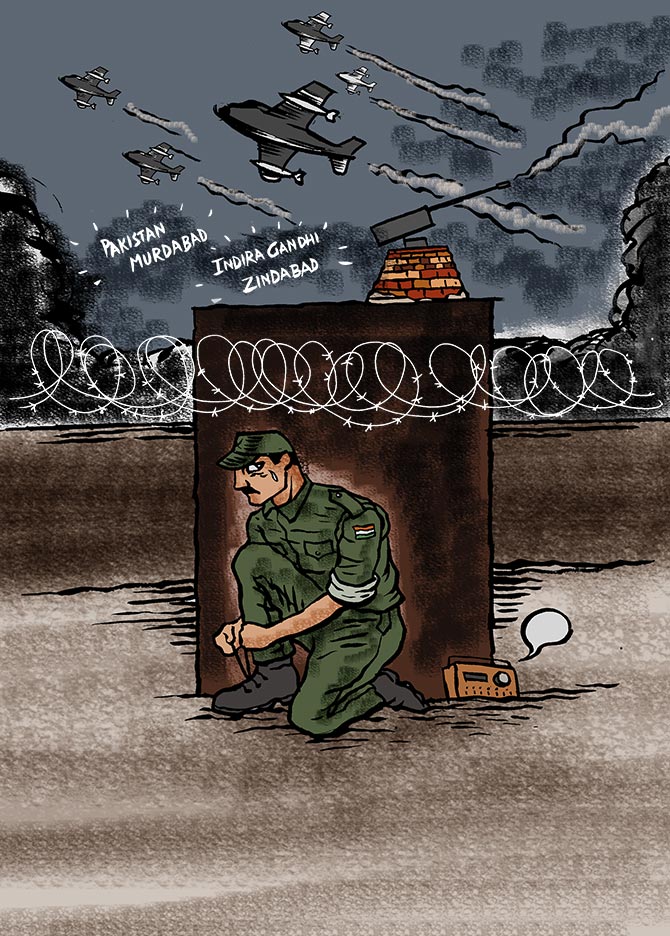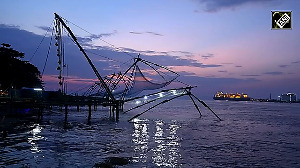On Wednesday, India confirmed that a pilot of a MiG fighter had been taken prisoner by Pakistan amid attempts of foiling an attack by the neighbouring country.
In light of his capture, Rediff.com republishes this piece written by Colonel Anil A Athale (retd) on the year he spent as a prisoner of war in Pakistan during the 1971 War.
During a war, there are just four possibilities a soldier faces.
One: Victorious and safe.
Two: Wounded.
Three: Killed in action.
Four: Prisoner of War.
It was my fate to face the fourth, says Colonel Anil A Athale (retd) on the year spent as a prisoner of war in Pakistan during the 1971 War.
Illustration: Dominic Xavier/Rediff.com

December 5, 1971.
Six Gorkha soldiers and I were on a reconnaissance patrol on the western border in Punjab, along the Ravi river, when the Pakistani army launched a sudden attack through that area.
We were literally caught between a rock and a hard place as we were initially shelled by Pakistani guns, and later, as they overran the small border pocket, by Indian artillery.
Thankfully, neither side hit us, and less than 48 hours later, the active war ended for me and my six men.
My ordeal, however, had just begun.
They say memories of stress and extreme danger remain with us forever. The memories of that time are as fresh in my mind as if it all took place yesterday.

Sitting: Lieutenant G R Chaudhari, a Red Cross official, Captain Mehrotra and Lieutenant Gurung at the Lyallpur Jail in Pakistan.
This photograph was sent by the Red Cross official seen here to Captain Athale's family.
My interrogators soon realised that I was useless as a source of information.
With just three years of military service, I was far too junior to be privy to strategic secrets. Besides, an infantryman's view of the war is at best a worm's eye view, limited to a radius of four to five kilometres from his position.
In your own area of operation, small trees, a few mud huts, a few feet high mound of earth are all of vital importance. But this tactical information, specially in the plains, is of no earthly use to the enemy.
In addition, I had just come to the battalion after finishing a training course in Mhow, and was thus even more clueless about the larger picture.
All this went in my favour, and that is possibly why I had a relatively easy time during the interrogation and survived to tell the tale.
But the fear factor was very much present in the shape of the gallant Indian Air Force.
For every sunrise, sunset and midnight, Rawalpindi was subjected to IAF air raids.
The cell in which I was lodged had an anti-aircraft gun located right on top, and the entire complex would vibrate from its recoil as it fired at the attacking aircraft.
The first time this happened at midnight, I immediately woke up and put on my boots, ready to escape in case a bomb fell on the cell.
After a while it became a routine affair, and I stopped reacting that way. Luckily for me, there were no direct hits on the interrogation centre.
In fact, the constant bombing raids did wonders for my morale, even as it decimated that of the Pakistanis'.
Every time an air raid took place, I could hear the sentries hurling choicest Punjabi abuses at the aircraft, shaking their fists in frustration.
Within a fortnight I was shifted to Rawalpindi jail and lodged in the maximum security cells meant for condemned prisoners.
To prevent prisoners from committing suicide, these cells had high ceilings and nothing inside.
By now the air raids had stopped, and I could guess that the war was over.
While I was in solitary confinement in my cell, I would often hear noises from other prison barracks. Every now and then the prisoners there would shout slogans like 'Pakistan Murdabad', 'Indira Gandhi Zindabad' and 'General Aurora Zindabad.'
Who were these people?
Finally, after repeated queries, a sentry told me they were 'those **** Baluchis'.
Apparently, during the war, there were processions and protests in Baluchistan against Pakistani rule, and many Baluch leaders were jailed.
Is the situation much different today?
One day, a major (as I deduced from his shoulder patches) from the Pakistani army's General Headquarters paid me an unexpected visit. His week-old stubble and bleary eyes spoke of immense stress and sleepless nights. He looked at me grimly and asked if I had seen Rawalpindi.
I had been blindfolded during my journey and later confined to my cell, I replied. All of a sudden, he blurted out: 'Don't worry, one day you will come here as a conqueror and you can see it to your heart's content!'
I was flabbergasted. This was the first indication that we had indeed won the war.
For non-military folk, a major from the GHQ operations branch was a big shot. Even in our own army, an officer of a major's rank used to head the entire internal security section till the 1980s.
Close to December 31, I heard a massive procession passing by outside, shouting slogans like 'Quaid-e-Azam Bhutto Zindabad.'
An hour later, I heard the same procession again, but the slogans this time were different. 'Hamara Naya Sardar Bhutto Zindabad' (Victory to our new President Bhutto).
I told my sentry that there had been a coup in his country, and they had a new president.
It was much later that I learnt that the old Rawalpindi jail where I was housed was adjacent to the president's palace.
Zulfiqar Ali Bhutto was kept in those very cells for condemned prisoners before being hanged by Zia-ul Haq in 1979. Benazir Bhutto during her premiership ordered the demolition of the old jail, and there is a public park in its place now.
By now the atmosphere in the jail had become a lot less tense. A Pakistani army officer told me the story of the coup.
How when Zulfiqar Ali Bhutto confronted General Yahya Khan with a resignation letter, he refused.
How Yahya's aide-de-camp took out his pistol and threatened Yahya, who then signed the resignation, literally at gunpoint.
In February, I was shifted to a proper prisoner of war camp in Lyallpur (now Faisalabad), where I joined five other Indian army officers.
Lieutenant Colonel Mohammed Latif Malik was the commandant of the PoW camp at Lyallpur.
Right at the outset, he took us on a tour of the 'camp' (which was actually Lyallpur jail) to show us the security arrangements.
It was indeed a formidable jail, with three rings of 10 feet high walls, and watchtowers with machine guns and searchlights.
He then told us that as Prisoners of War it was our right to attempt to escape, and his right to shoot us if caught.
Frankly, the formidable security made most of give up any notions of escape.
By now we were permitted to get Pakistani newspapers, which gave us an idea of the extent of our victory.
The situation of Indian PoWs in Pakistan after the Bangladesh victory was unique in many ways, and very different from that of Pakistani PoWs in India.
The fact that we had won the war was reflected in the Pakistani behaviour towards us. It would not be an exaggeration to say that I received more smart salutes from Pakistani soldiers than our own.
There were seven of us officers and around 600 jawans held in Lyallpur.
The highest ranking Indian officer was a major. I was then a captain and the third senior-most, with just three years service.
Against that, Pakistan had close to 93,000 prisoners in India, including many generals.
The Pakistani behaviour towards the Indians was correct, gentlemanly and courteous to a fault.
Many Pakistanis shared their happiness that their soldiers were in Indian Army custody and not in Bangladeshi captivity.
They also expressed their happiness that they were rid of Bangladesh, which they described as a burden, and warned us that soon we would regret having created it.
In some ways, it was a prophetic remark.
All armies have their peculiar internal dynamics. While in the Indian Army the 'working class' is essentially the junior officers, lieutenants, captains and majors, in Pakistan it is their NCOs (Non Commissioned Officers) like naiks and havaldars (like the US army, that is run by their sergeants).

The Pakistani NCOs then were well educated, motivated and had lots of initiative. In our army, close to a third of NCOs end up as officers through the in-service route.
I once asked a particularly bright Pakistani NCO why he did not try for commission as officer. His reply was revealing.
'In Pakistan,' he said, 'to become an officer you have to have an 'uncle'!'
In a sense that situation seems to prevail even today. There is a oft repeated story about how Pakistani prisoners in India told our officers that they would prefer to fight under them. This is the same story we heard in Pakistan under very different circumstances.
The same NCO told us that 'Sir, our jawans and your officers, together we can conquer the world.' We, of course, told them that we prefer our own jawans.
I cannot conclude this narrative without recalling an interesting incident.
In 1972, possibly as a part of psychological war, the Indians started a programme of daily broadcasts by Pakistani PoWs to tell their family about their well-being.
Not to be left behind, Radio Pakistan began a similar exercise, and their team came to Lyallpur to record our messages. We were given a piece of paper with lines to read out. 'We surrendered to Pakistan and are being treated well here,' it said.
When my turn came I refused, saying I had never surrendered to the Pakistani army, I was captured.
There is indeed a world of difference between a ceremonial laying down of arms (as the Pakistanis did in Bangladesh) and being captured in battle. The latter does not involve the trauma or the humiliation of the former.
When the Radio Pakistan man insisted, I told him I would rather do without the message, since in any case information about my being alive had already been sent to my family through the Red Cross.
The infuriated Pakistani official then warned me that there was no guarantee Aaj hai to kal nahin (You are alive today, but who can be sure of tomorrow?).'
Enraged by this comment, I replied: 'Do not worry, I have an insurance of 93,000 !'
This provoked the man to lunge at me, before he was restrained by Pakistani soldiers. Finally the camp commandant arrived and told me that if I had objections, then my message would not be broadcast.
The matter did not end there. Seeing my example, all the Indian jawans who had come for the recording also refused to do so.
As the days passed, a sense of desperation crept in on us.
Our spirits were buoyed when Indira Gandhi's principal advisor D P Dhar visited Pakistan in early 1972.
Then came the historic Simla Agreement of July 2, 1972. But the repatriation of Prisoners of War remained mired in controversies.
Bangladesh demanded the handing over of 'War Criminals' from among the Pakistanis held in India, and our fate got linked to the 'high politics' of the subcontinent being played out at the time.
The situation in Pakistan was desperate. With 93,000 prisoners in India, a very large segment of the Pakistani population, specially in Punjab, was directly affected.
Every time news of riots in the PoW camps in India and the killing of Pakistanis reached Lyallpur, huge crowds would throng the Lyallpur jail gates, thirsting for revenge.
At times like these we thanked our stars that the jail walls were solid enough not to let anyone in.
Towards the end of November 1972, Prime Minister Zulfiqar Ali Bhutto decided to pay us a visit.
In an obvious attempt to pressure the Indian government to release Pakistani POWs, he addressed us in the full glare of the international media and announced that Pakistan had decided to 'unilaterally' release Indian prisoners.
Our hearts sank when we heard that Prime Minister Indira Gandhi had responded by agreeing to release only Pakistani prisoners caught on the Western Front.
But to our great relief, Pakistan accepted this offer and we began our journey home on the night of November 30, 1972.
There were tears in every eye as we reached the Wagah border late in the evening. The reception at Wagah was truly spectacular.
Giani Zail Singh, then the chief minister of Punjab, warmly embraced each and every one of the 600 officers and men.
There were bands playing, bhangra dancers and welcome arches all the way from Wagah to Amritsar.
Crowds lined the route, eager to shake hands, thrusting babies at us to be kissed, throwing flowers.
By the evening all of us had sore shoulders and bruised hands, but no one was complaining.
This was followed a civic reception at Amritsar, where we were showered with gifts and the typical Patiala Peg of Punjabi hospitality.
As the special train carrying us steamed into the Delhi cantonment railway station, Field Marshal Sam Maneckshaw was there to receive us, breaching protocol. He promised us that we would all reach home within two weeks.
This was a welcome pledge, since many of us had heard horror stories about how prisoners released by China after the 1962 border war were detained and grilled for months.
But then that was a war we lost. This time a victorious army was welcoming its comrades.
This feature was first published on Rediff.com on December 6, 2006.










 © 2025
© 2025